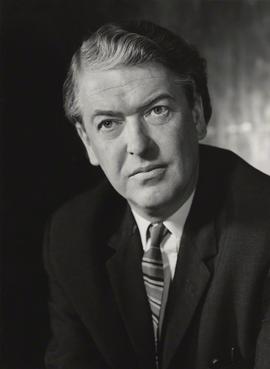Kingsley Amis's novel Lucky Jim (1954) earned him a place among the first of the writers known in the 1950s as the Angry Young Men. However, while John Osborne, in Look Back in Anger (1956), the play which gave the group its name, expressed rebellious resentment and bitterness, Amis channelled his energies into comedy and social satire. As well as novels and essays Amis wrote literary criticism and several volumes of poetry. He was awarded the Booker Prize for ‘The Old Devils’ in 1986. His son was yet another successful novelist Martin Amis.
Amis served as a lieutenant in the Second World War and later taught at universities in England, Wales and America.
His first novel, Lucky Jim, a satire on academia and campus life, achieved immediate popularity and won the Somerset Maugham Award. It clearly marks the development of Angry Young Men movement. Angry Young Men as a group, was the rise of a generation of young people from middle- and lower-class backgrounds who had gained access to higher education as a result of the changes in English education system brought about by the Education Act of 1944. Having risen in society they then challenged the existing establishment, both social and literary, which was controlled by those from more privileged and traditional backgrounds.
In the story, the protagonist, Jim Dixon, has risen from his lower-middle-class background and begun a career as a lecturer at a provincial university but finds himself frustrated and infuriated by an academic establishment dominated by those from more privileged backgrounds than his own. Jim’s colleagues, his social ‘superiors’ against whom the satire is directed, are shown to be pretentious and hypocritical, in both their social behaviour and academic work.
Jim finds his way through the pretensions of others by following his instincts about what is worthwhile and what is false, and by learning to trust in his luck. The theme of luck is relevant n a number of ways, from the luck which determines one's social status to the good and bad luck in Jim's day-to-day affairs which provide much of the humour of the novel. When, at the end, he finally gains a better job and wins the girl of his choice, luck has played a part, but his honesty has helped to bring the luck his way and his courage has helped him grasp it.
Jim Dixon appears again in two other novels which satirise pretension and snobbery. In ‘That Uncertain Feeling’ (1955) he is a small-town librarian in Wales, and in ‘I Like It Here’ (1958), which drew on Amis’s experience of visiting Portugal, he is a writer abroad.
Lucky Jim is sometimes called a ‘campus novel’, having the theme of university life in common with John Wain's first novel, ‘Hurry on Down’, published a few months earlier in 1954, and later novels such as ‘The Masters’ (1951) by C. P. Snow, ‘The History Man’ (1975) by Malcolm Bradbury, and a number of novels by David Lodge, including ‘Changing Places’ (1975).
At Oxford Amis met and became friends with Philip Larkin. They shared a love of Jazz music, discussed their writing projects, and Lucky Jim was published with a dedication to Larkin. The two remained lifelong friends and had similar views on poetry, which resulted in their both having poems published in anthologies which became known as key works of The Movement: ‘Poets of the 1950s’ (1955), edited by D. J. Enright, and New Lines (1956), edited by Robert Conquest. The Movement poets, in reaction against what they saw as the elitism and pretension of Modernist Writers, such as those of the Bloomsbury Group, and the unrestrained experimentation of poets such as Dylan Thomas, wrote careful, disciplined verse. Other Movement poets included Thom Gunn, D.J. Enright, John Wain and Elizabeth Jennings.
After the death of Ian Fleming (known for James Bond series of spy novels), Amis wrote a James Bond like novel, Colonel Sun (1968), under the pseudonym Robert Markham. In his later novels he moved away from social comedy to explore other types of fiction. ‘The Riverside Villas Murder’ (1973) is a detective story which reconstructs a murder which took place in the 1930s, the era of Amis s childhood. ‘Ending Up’ (1974) deals with old age, while ‘The Alteration’ (1976) explores the prospect of the Reformation never having taken place and the Papacy retaining its power.
Amis also published several works of literary criticism, including a crituque of science fiction, New Maps of Hell (1960), The James Bond Dossier (1965), What Became of Jane Austen? (1975) and Rudyard Kipling and His World (1975).

No comments:
Post a Comment
looking forward your feedbacks in the comment box.